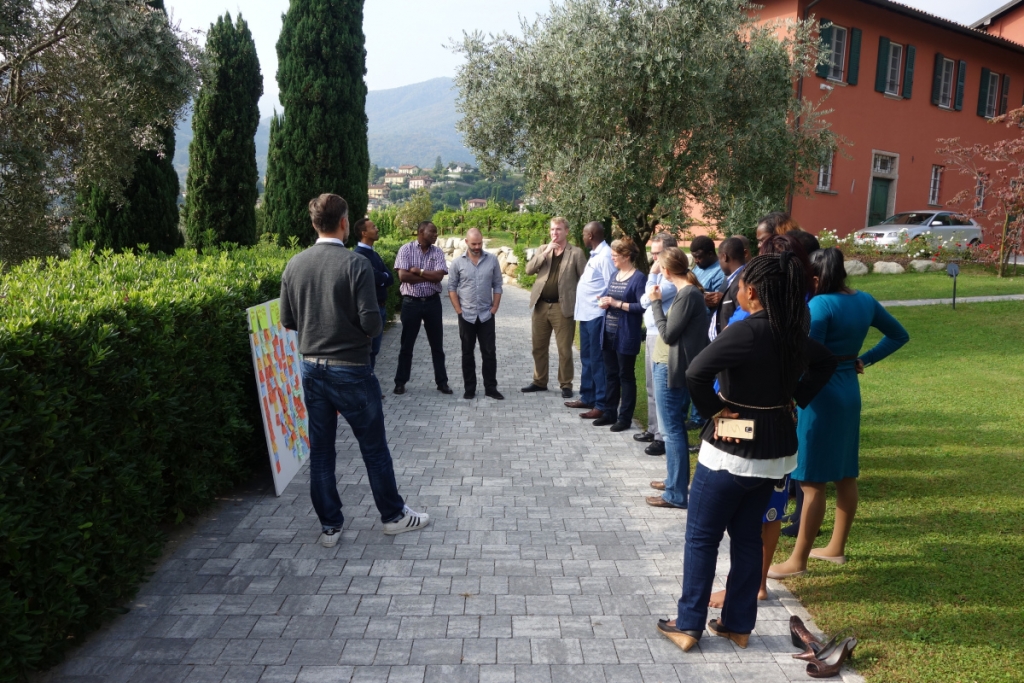Dr Laura Mann presents the Connectivity at the Bottom of the Pyramid White Paper, co-written with Dr Kate Meagher. The White Paper follows on from a workshop held at the Rockefeller Foundation Bellagio Centre in 2016, which brought together stakeholders to address the challenges of digital inclusion for workers at the bottom of the pyramid in Africa.

Last year, my colleague Kate Meagher and I organised a conference at the Rockefeller Conference Centre to explore the opportunities and challenges presented by digital technology technologies and projects for informal workers at the Bottom of the Pyramid. We focused on four sectors central to ICT engagement in African informal economies: agriculture, business process outsourcing (BPO), mobile money and transport.
We brought together ICT activists, social entrepreneurs, and key actors in private ICT-based companies, with government officials, civil society actors, academics and informal economy activists from across Africa, including Ghana, Nigeria, Kenya, Somalia and South Africa, along with ICT and informal economy specialists from the UK, Ireland, USA and Croatia. Conference participants worked together to explore how the rapidly changing landscape of ICTs are affecting informal livelihoods and to consider their actual as opposed to their assumed effects on informal workers and consumers. We were confronted by significant sectoral differences in the way ICTs are used, differences in the organization of informal activities and livelihoods, as well as regulatory differences in how different African countries grapple with the disruptive possibilities and challenges of ICTs and large informal economies.
In each sector, 5 broad questions underpinned our inquiry:
1) How are ICTs reshaping livelihoods and value chains within the informal economy?
2) Which actors are currently empowered and included, and which are currently disempowered or displaced through the application of ICTs?
3) How might design and decision-making processes be more inclusive of the concerns of informal actors?
4) What appropriate forms of regulation or promotion of new business models are needed to protect vulnerable informal actors from unforeseen consequences of ICT interventions?
5) How can civil society groups better raise awareness within tech communities, African policy circles and informal associations about both the potential opportunities and risks of ICT-led restructuring of sectoral activities and associated informal livelihoods.
Our White Paper discusses these questions across all four sectors while our shorter policy briefs focus on individual sectors (Agriculture, Impact Sourcing, Mobile Money, Transport) and our the key questions for policy-makers (Best Practice for the BOP).
Workshop Participants:
Ibrahim Abdirahman, GOLAT, Daniel Asare-Kyei, E-Soko, Nerisa Bernhardt, FAIRPAY, Padraig Carmody, Trinity College Dublin, Richard Dobson, Asiye Etafuleni, Deborah Freeman, Trade Union Congress, Ghana, Tin Geber, The Engine Room, Gianluca Iazzolino, Oxford University, Faith Kamechu, Syngenta Foundation, Jackie Klopp, Digital Matatus and Columbia University, Laura Mann, LSE, Kate Meagher, LSE, Topyster Muga, Airtel Money, Bitange Ndemo, University of Nairobi, Gbenga Sesan, PIN Nigeria, Geoffrey Wandera, Kenya Bus Services, Francis Wasa, Central Bank of Nigeria, Peres Were, Digital Divide Data
Laura Mann (@balootiful) is an Assistant Professor in the Department of International Development at the LSE. She is a sociologist whose research focuses on the political economy of markets and new information and communication technologies in Africa.
The views expressed in this post are those of the author and in no way reflect those of the International Development LSE blog or the London School of Economics and Political Science.





